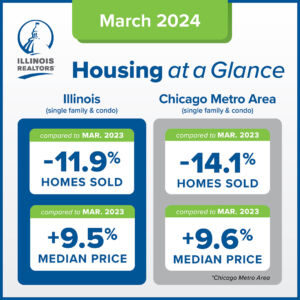Cocktail napkins & other offers to purchase
In Illinois, listing brokers are compelled by both statute and the REALTOR® Code of Ethics (“Code”) to present all offers they receive, which are made on behalf of a buyer. A seller’s ultimate goal and the broker’s duty is to find the best possible deal for their client’s property. Sellers are interested in receiving all legitimate offers - thus it is often added (half-jokingly), that includes presenting not just offers on a written contract, but even those received on a cocktail napkin or even via carrier pigeon. But how do these legal and ethical requirements apply if a listing broker attempts to restrict the method offers are submitted?
Under both the Illinois Real Estate License Act, Section 15-15 (“Act”), and Article 1 of the Code, the seller’s agent must relay all offers objectively and as soon as practicable. Also relevant here, REALTORS® have an ethical duty under Article 3 of the Code to cooperate with other brokers unless cooperation is against the seller’s best interests.
Sometimes, listing agents will post comments in local/regional MLSs where the property is added, that the seller will only consider offers presented on one local association’s form purchase contract. These comments naturally raise many serious questions, including first and foremost: Was that truly the seller’s idea and specific instruction? Some other questions are: Will this limitation serve the seller’s best interest? Does the seller really understand how they might be limiting their options? and What explanation did the listing broker provide to their client?*
Typically, a seller will not know or care how an offer might come in. Sellers generally want to sell their property to the best qualified buyer depending on seller’s circumstances and motivation for selling. Under Article 1 of the Code, Standard of Practice 1-6, and Sec. 15-15(a)(2)(b) of the Act, a listing broker is required to promptly present offers they receive and follow their seller’s lawful direction for a response (if the seller opts to respond). This means that, generally, even offers submitted on a neighboring association’s form contract, must be presented to the seller. Even in there is a required form, such as is the case in Winnebago County, IL, an offer that comes in on another area form should be presented to the seller with listing broker advising legal assistance and perhaps making a counter-offer on the court-approved form.
A broker’s duty to act in the best interests of their client, together with their corresponding duty under Article 3 of the Code to cooperate with other brokers, could even be understood to recommend presenting offers received on a written contract form that the seller has previously indicated a preference against. Failure to present such an offer would deprive the seller the opportunity to counter the buyer on the seller’s preferred form or even to simply change their mind on which contract form should be used.
Restrictions like these should be viewed very cautiously for each seller’s sake but also generally speaking, for the sake of competition in the local marketplace. If the listing broker is the driving force behind language in an MLS limiting the type of offers the seller will review, on its face this action looks anti-cooperative and anti-competitive. In fact, it’s this type of conduct that invites the type of regulatory scrutiny that MLSs have recently seen.
When used properly, the MLS platform and the corresponding REALTOR® rules regarding MLS-of-Choice and Board-of-Choice ensure a competitive and fair marketplace for sellers and buyers and the REALTOR® practitioners who serve them. Artificial constraints, such as limiting the forms which are acceptable for offers can only restrain that marketplace and in the process, create strain between REALTORS® and local boards.
*Note: This article speaks in general terms and does not address other possible concerns like, brokers engaging in the unauthorized practice of law; or the fact that there is one county in Illinois that does use a form mandated by a court-approved consent decree.
About the writer: Elizabeth A. (Betsy) Urbance, General Counsel and Vice President of Legal Services has served the association’s members as General Counsel since 2018 and prior to that she was Legal Hotline Attorney since 1994. Urbance is a 1984 graduate of Western Illinois University and received her law degree from the University of Missouri School of Law in 1987. She is licensed in both Illinois and Missouri.





 Create professional development programs that help REALTORS® strengthen their businesses.
Create professional development programs that help REALTORS® strengthen their businesses.
 Protect private property rights and promote the value of REALTORS®.
Protect private property rights and promote the value of REALTORS®.
 Advance ethics enforcement programs that increase REALTOR® professionalism.
Advance ethics enforcement programs that increase REALTOR® professionalism.
 Protect REALTORS® by providing legal guidance and education.
Protect REALTORS® by providing legal guidance and education. Stay current on industry issues with daily news from Illinois REALTORS®, network with other professionals, attend a seminar, and keep up with industry trends through events throughout the year.
Stay current on industry issues with daily news from Illinois REALTORS®, network with other professionals, attend a seminar, and keep up with industry trends through events throughout the year.



